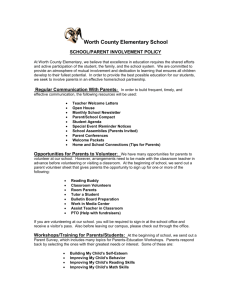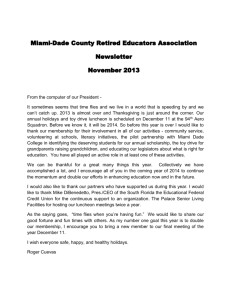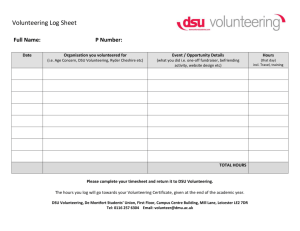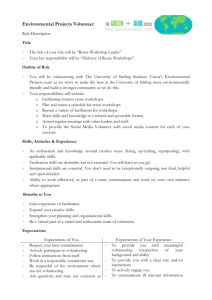module specification module specification
advertisement
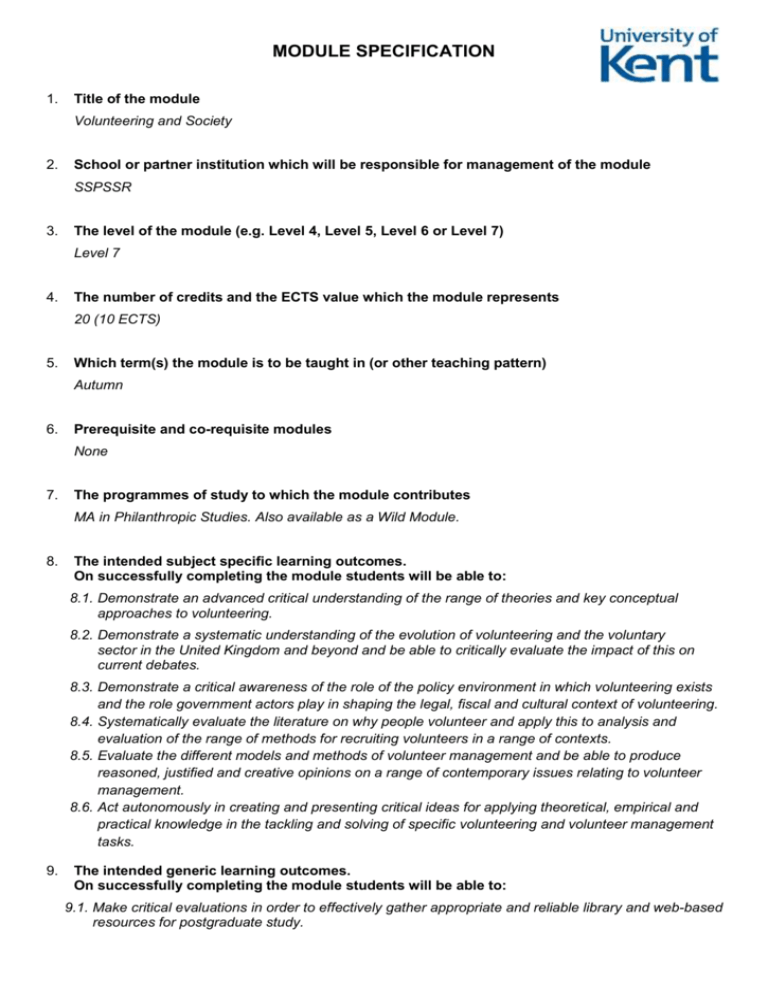
MODULE SPECIFICATION 1. Title of the module Volunteering and Society 2. School or partner institution which will be responsible for management of the module SSPSSR 3. The level of the module (e.g. Level 4, Level 5, Level 6 or Level 7) Level 7 4. The number of credits and the ECTS value which the module represents 20 (10 ECTS) 5. Which term(s) the module is to be taught in (or other teaching pattern) Autumn 6. Prerequisite and co-requisite modules None 7. The programmes of study to which the module contributes MA in Philanthropic Studies. Also available as a Wild Module. 8. The intended subject specific learning outcomes. On successfully completing the module students will be able to: 8.1. Demonstrate an advanced critical understanding of the range of theories and key conceptual approaches to volunteering. 8.2. Demonstrate a systematic understanding of the evolution of volunteering and the voluntary sector in the United Kingdom and beyond and be able to critically evaluate the impact of this on current debates. 8.3. Demonstrate a critical awareness of the role of the policy environment in which volunteering exists and the role government actors play in shaping the legal, fiscal and cultural context of volunteering. 8.4. Systematically evaluate the literature on why people volunteer and apply this to analysis and evaluation of the range of methods for recruiting volunteers in a range of contexts. 8.5. Evaluate the different models and methods of volunteer management and be able to produce reasoned, justified and creative opinions on a range of contemporary issues relating to volunteer management. 8.6. Act autonomously in creating and presenting critical ideas for applying theoretical, empirical and practical knowledge in the tackling and solving of specific volunteering and volunteer management tasks. 9. The intended generic learning outcomes. On successfully completing the module students will be able to: 9.1. Make critical evaluations in order to effectively gather appropriate and reliable library and web-based resources for postgraduate study. MODULE SPECIFICATION 9.2. Act autonomously in using web-based resources to augment knowledge gained from online seminars and web-based study materials. 9.3. Demonstrate self-direction, critical judgement, and theoretical knowledge in accessing, interpreting and analysing data. 9.4. Use selected resources to construct critical arguments and be able to communicate these conclusions clearly to specialist and non-specialist audiences. 9.5. Apply problem solving skills in the planning and implementation of professional practice based tasks. 9.6. Apply critical reflection to both individual and organisational practice. 10. A synopsis of the curriculum This module will give an advanced level overview of the current state of volunteering in the UK. Aimed at those working in or seeking to work in the voluntary sector, it will cover a range of topics which will facilitate a detailed and critical analysis of the role of volunteering in society. It will allow students to explore this knowledge through its application in real life contexts that they encounter in their professional practice. The module will cover academic approaches to volunteering from a range of disciplinary viewpoints and how these seek to explore who volunteers (and who does not) and what volunteers do. To enable this advanced level knowledge to be used in practice, the module will explore the current debates in volunteer management, debates on policy regarding volunteering and its management, legal studies on volunteering and on ways in which the impact that volunteers have can be managed. Students will gain from all of this a critical understanding of volunteering and its role in society, and the ways in which volunteers can be supported. 11. Reading List (Indicative list, current at time of publication. Reading lists will be published annually) Davis Smith, J., Rochester, C. and Hedley, R. (Eds.) (1997) An Introduction to the Voluntary Sector. London: Routledge. Dinham, A. (2009) Faiths, Public Policy and Civil Society. Basingstoke: Palgrave Macmillan. Eliasoph, N. (2013) The Politics of Volunteering. Cambridge: Polity. Hedley, R. and Davis Smith, J. (Eds.) (1992) Volunteering and Society: Principles and Practice. London: NCVO. McCurley, S., Lynch, R. and Jackson, R. The Complete Volunteer Management Handbook. London: Directory for Social Change. Musick, M. and Wilson, J. (2007) Volunteers: A Social Profile. Bloomington: Indiana University Press. Puttnam, R. (2000) Bowling Alone: The collapse and revival of American community. New York: simon and Schuster. Rochester, C. (2013) Rediscovering Voluntary Action: The beat of a different drum. Basingstoke: Palgrave Macmillan. Rochester, C., Ellis Paine, A. and Howlett, S. (2011) Volunteering and Society in the 21st Century. Basingstoke: Palgrave Macmillan. Taylor, R. (2005) Rethinking Voluntary Work. In Pettinger, L., Parry, J., Taylor, R. and Glucksmann, M. (Eds) A New Sociology of Work? Oxford: Blackwell. 2 Module Specification Template (September 2015) MODULE SPECIFICATION 12. Learning and Teaching methods Hours of study: 200 hours Contact time: This module will consist of 43 contact hours: one study day (6 hours); 10 online forums (20 hours); 30 short lectures/videos (10 hours); 10 podcasts or audio recordings (5 hours) and; tutor telephone and email mentor sessions and personal support (2 hours). Private study: In addition to contact hours, 157 hours of private study will be expected including reading materials, research and assignment preparation time. This module will be taught mainly through web based material, core texts, additional reading and a news feed provided via Moodle. These delivery methods will be combined with video recordings of lectures from Kent staff and external experts, TED Talks, podcasts and audio recordings, and online discussion forms. The video lectures will present key academic theories, empirical evidence and practitioner issues in a systematic way. Students will be equipped with an appropriate knowledge base and encouraged to critically engage in the analysis of theory, empirical evidence and practitioner knowledge. Case studies will be used in the teaching to contextualise the knowledge acquired. Students will be given tasks based on each week’s study resources which will enable them to summarise and analyse what they have seen, heard or read and contribute to online forums. The purpose of the online forums is to enable student-to-student and student-to-lecturer discussion on the week’s specific topic. They are particularly useful for distance learning courses where students have limited access to each other and to teaching staff as they encourage debate and the exploration of subjects. Students will be expected to carry out private study in accordance with the calendar for the module. As well as the audio-visual learning resources there will also be weekly core and supplementary reading (which will be available online) and worksheets to enable students to critically understand the key concepts in these readings. The study day will give the students the opportunity to engage in discussion and debate, to undertake group work, and to give non-assessed presentations. They will receive feedback on their presentations through formative assessment which will allow students to reflect on their progress and on the skills needed to study and to practice at an advanced level. 13. Assessment methods. This module will be assessed by a 3,000 word coursework essay (50%), by a 2,000 word volunteer policy document (40%) and an online forum participation mark (10%). Students will submit a coursework essay of 3,000 words. The essay for this module is based on a choice of essay questions which are designed to test students’ ability to critically investigate the ideas, theories and concepts covered in the module. The essay question choices necessitate analysis of the key concepts in volunteering and their relevance to contemporary volunteering and volunteer management. Students will also submit a volunteer policy document of 2,000 words. The intention is that students demonstrate an understanding of the following: the legal and social policy context relevant to volunteering, the need for volunteer management, and the methods for measuring volunteer impact. It is a requirement that the volunteer policy document is written in a clear and jargon free style, so that it can be read and understood by a diverse audience. Students will also be required to actively participate in forum discussions. To obtain these marks students will be required to make a minimum of three contributions to the assessed forum. Each contribution must be at least two paragraphs in length, include academic references and a discussion of the relevant materials identified within the module. The forum content will be moderated by the module convener. 3 Module Specification Template (September 2015) MODULE SPECIFICATION 14. Map of Module Learning Outcomes (sections 8 & 9) to Learning and Teaching Methods (section12) and methods of Assessment (section 13) Module learning outcome 8.1 8.2 8.3 Learning/ teaching method Hours allocated Study Day 6 x Online Forums 20 x x x Online Lectures/Video s & Talks 10 x x x Audio Recordings 5 x x x 157 x x x Reading and private study 8.4 8.5 8.6 9.1 x x 9.2 9.3 9.4 9.5 9.6 x x x x x x x x x x x x x x x x x x Assessment method Essay (3,000 word) Volunteering Policy Document x x x x x x x x x x x x x x x x x x x x x x x x x x x x x (2,000 word) Online Participation x x 15. The School recognises and has embedded the expectations of current disability equality legislation, and supports students with a declared disability or special educational need in its teaching. Within this module we will make reasonable adjustments wherever necessary, including additional or substitute materials, teaching modes or assessment methods for students who have declared and discussed their learning support needs. Arrangements for students with declared disabilities will be made on an individual basis, in consultation with the University’s disability/dyslexia student support service, and specialist support will be provided where needed. 16. Campus(es) or Centre(s) where module will be delivered: Canterbury, via online distance learning FACULTIES SUPPORT OFFICE USE ONLY 4 Module Specification Template (September 2015) MODULE SPECIFICATION Revision record – all revisions must be recorded in the grid and full details of the change retained in the appropriate committee records. Date approved Major/minor revision Start date of the delivery of revised version 07/01/16 New September 2016 5 Module Specification Template (September 2015) Section revised Impacts PLOs (Q6&7 cover sheet)




